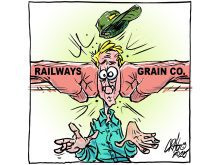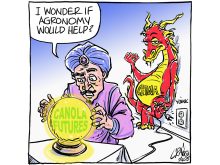It’s simple human nature to react more with yawns than action when faced with an imminent crisis that still seems too far away to take seriously.
It’s a phenomenon that must have climate scientists pulling their hair out these days as their warnings about a climate emergency continue to fall on deaf ears in many corners of society.
The same must go for crop scientists who warn about looming dangers such as disease outbreaks and herbicide resistance but don’t see the appropriate level of action from producers.
Read Also

High prices see cow-calf producers rushing to incorporate
Farm accountants are reporting a steady stream of cow-calf producers rushing to get their operations incorporated ahead of selling their calves this fall.
It’s not a new phenomenon, by any means. After all, human nature is deeply ingrained and difficult to change.
However, it can also have dangerous consequences if we don’t take flood warnings seriously until the water is lapping at our doorstep.
This is why it is so encouraging to see two cases in the livestock sector that are defying this deep-seated tendency.
The first is African swine fever.
Scientists tell us it’s a matter of if, rather than when, this terrible hog disease finds its way to Canada.
The economic consequences would be devastating, but for once, we’re acting before the flood arrives.
The Pan-Canadian Action Plan on African swine fever has been developed to avoid the worst case scenario — a total loss of market access.
The plan includes zoning and compartmentalization initiatives, which would contain the disease in a geographic area and ensure that most of the industry can continue doing business.
The federal government is also negotiating with our trading partners to ensure that they will be prepared to honour these efforts when the worst happens.
More can certainly be done before the trade tsunami hits, but it’s encouraging to see that we’re already lacing up our racing sneakers instead of waiting for the starter pistol to fire first.
The most recent good news to come out of the livestock sector concerns foot-and-mouth disease.
If there ever was an animal disease that might produce apathy, it would be this one, considering the last outbreak in Canada occurred in 1952.
But that’s not what’s happening.
Besides the usual work on developing strict import rules, on-farm biosecurity and disease surveillance, the livestock industry has lobbied the federal government to set up a vaccine bank in case of an outbreak.
And the government has listened.
Two years ago, Ottawa committed $57.5 million over five years, plus ongoing funding, to develop the bank and response plans.
And now, it just announced that it has awarded contracts to two companies to supply the vaccines and develop the vaccine bank.
Borders will close if the disease is detected, and the economic threat in this country has been estimated at $22 to $75 billion.
It would have been incredibly tempting to convince ourselves that since we’ve kept the disease at bay for 73 years, there was no reason to think we couldn’t continue to keep doing so.
But instead, producers and government recognized the folly of such an approach and are taking steps to prepare for the flood before it breaks.
Like with the African swine fever case, this shows that sometimes it’s possible to circumvent the less desirable side of our human nature and do the right thing before calamity strikes.
It’s a lesson the human race could apply to other looming disasters as well.















